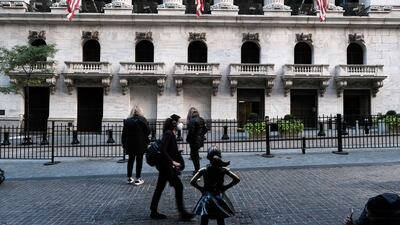Stock markets around the world ended the week mixed, but Wall Street banked on a strong finish on Friday to end higher on hopes that the Federal Reserve will take a less aggressive stance on interest rate rises.
Analysts and investors are expecting another 75-basis-point interest rate increase from the US central bank at its next meeting in November — which would be a fourth straight supersized increase — but some Fed officials are now leaning towards a toned-down approach, the Wall Street Journal reported on Friday.
Mary Daly, the president of the San Francisco Fed, said on Friday that she was concerned about the risks of high interest rates and the damage they may do to the world's biggest economy.
“I think the time is now to start talking about stepping down. The time is now to start planning for stepping down,” she said.
At the closing bell on Friday, the Dow Jones Industrial Average gained 2.5 per cent, while the S&P 500 rose 2.4 per cent. The tech-heavy Nasdaq Composite settled 2.3 per cent higher.
For the week, all indices recorded their biggest weekly percentage gains in four months, with the S&P 500 advancing 4.74 per cent, the Dow climbing 4.9 per cent and the Nasdaq increasing 5.22 per cent.
Social media company stocks, however, were pulled down by news that concerned investors, most notably Elon Musk's plan to cut three quarters of Twitter's workforce. Shares of the microblogging dropped almost 5 per cent at the close.
Snapchat owner Snap, meanwhile, plunged more than 28 per cent after it missed third-quarter revenue expectations and gave a dim forecast for the fourth quarter. Facebook parent Meta declined 1.2 per cent.
In Europe, London's FTSE 100 closed 0.4 per cent higher amid a continuing political saga that peaked on Thursday when Prime Minister Liz Truss announced her resignation, a fallout from her controversial mini-budget plan comprises unfunded tax cuts and spending promises.
The plan caused markets to panic and sunk the pound to a record low. Market watchers will be monitoring who will succeed Ms Truss — the shortest-tenured prime minister in Britain's history — from a field that includes former finance minister Rishi Sunak and her immediate predecessor, Boris Johnson.
“Normally, a prime minister's resignation means uncertainty and limited visibility; it’s not a preferred scenario for the market. But the little time Ms Truss stayed in power was so hectic that investors welcomed the news that she departs sooner rather than later,” Ipek Ozkardeskaya, a senior analyst at Swissquote Bank, said in a note.
“Of course, what happened in the UK over the past weeks is also a warning for the new prime minister and his or her team — that there are limits that cannot be breached. Financial discipline is one of those. Britain learnt it the hard way.”
Adding to the Downing Street saga was the decision of Moody's Investors Service on Friday to downgrade the UK's credit score outlook to negative, citing “heightened unpredictability in policymaking”.
Earlier in Asia, Tokyo's Nikkei 225 closed 0.4 per cent lower after it was reported that the Japanese government and the central bank intervened to support the yen, which has dived to multiyear lows.
The Nikkei Asia reported the intervention, rumours of which have been circulating during the week. However, Tokyo nor the Bank of Japan has yet to confirm any such move.
Among other major Asian financial hubs, Hong Kong's Hang Seng Index dropped 0.4 per cent and the Shanghai Composite rose 0.1 per cent at 3,038.93.
In commodities, oil prices settled higher amid expectations of tighter crude supply, hopes of stronger demand from China and a weakening US dollar.
Brent settled up 1.12 per cent at $93.50 a barrel, while West Texas Intermediate closed 0.54 per cent higher at $85.05 a barrel.
Gold, meanwhile, rose as much as 1.8 per cent on Friday on Japan's yen move, dragging the dollar lower and increasing the appeal of the asset considered to be a safe haven by investors.
Gold for December delivery rose about 1.6 per cent to settle at $1,656.30 an ounce.


